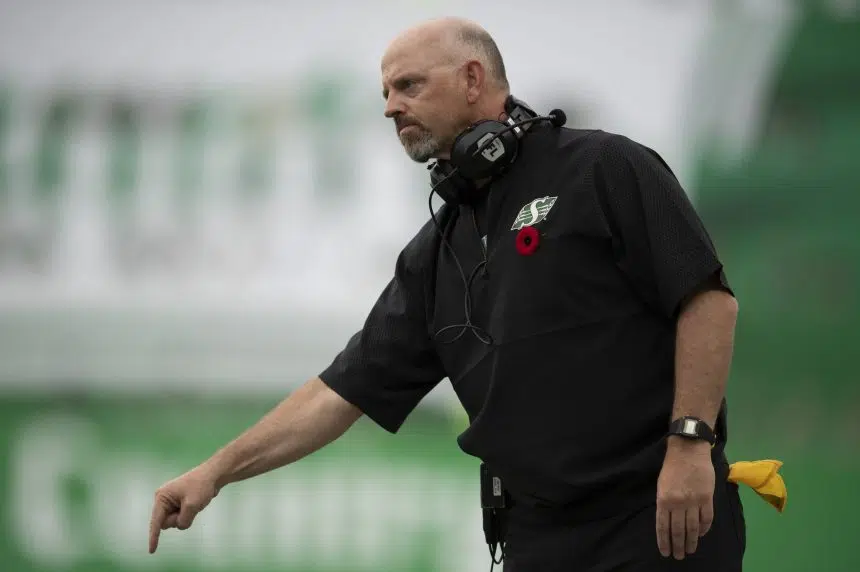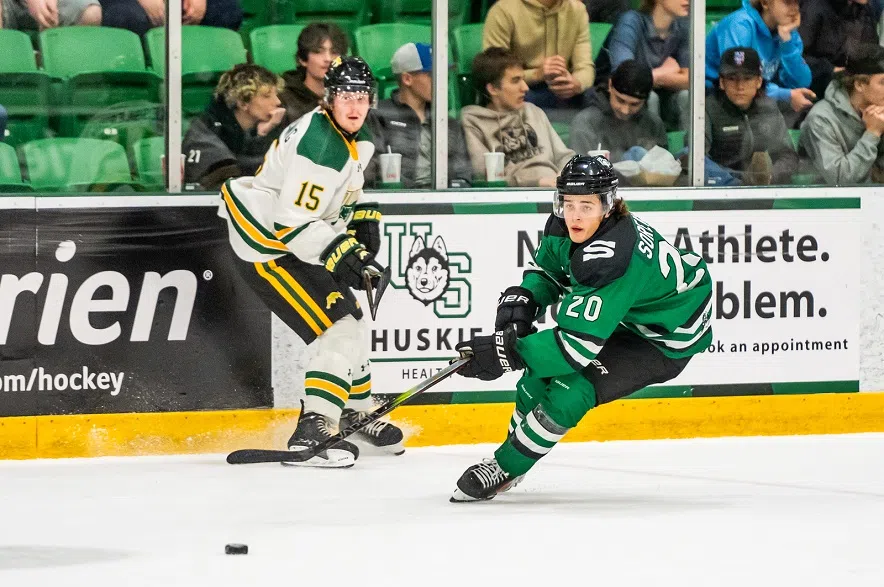A lengthy 24-year career as a co-ordinator eventually opened the door to a head coaching job for Craig Dickenson.
In 2019, Dickenson took over as the Saskatchewan Roughriders bench boss after then-head coach and general manager Chris Jones left for an opportunity with the NFL’s Cleveland Browns.
“I felt a sense of gratitude to (Riders general manager) Jeremy O’Day and the organization who believed in me enough to hire me and I wanted to work hard and make the organization proud and make them glad that they hired me and made that decision. I’m still trying to do that.”
Dickenson began his coaching career began back in 1995 when he became the special teams coordinator with the NCAA’s Montana Grizzlies.
It seemed only natural that Dickenson would eventually put on the headset and become a coach eventually.
Both he and his brother Dave, who is the head coach of the Calgary Stampeders, followed in the footsteps of their dad Bob.
“He coached his whole life and was a good athlete when he was a young man as well. He was a world-class speed skater growing up in Butte, Montana,” Dickenson said. “A lot of us ended up playing football at the college and university level so I think you just grew up around it and that’s kind of how it happened.”
While his dad was a big influence, Dickenson also praised his high school coach Jack Johnson for his development early on in life.
“He was a major influence in all of our lives. If you grew up in Great Falls, Montana, and went to school at C.M. Russell High School you wanted to be a football player and you wanted to play for coach Johnson,” Dickenson said. “Coach Johnson was probably my most influential coach as a player for sure and then I worked under some good ones.
“But my dad is my dad and he’s my hero and he’s the guy I’ve grown up admiring and still to do to this day. That’s the guy I’ve always wanted to please and be proud of me.”
His dad also played a big role in developing his affinity for camping and being outdoors.
“My dad’s a hunter and a fisherman and my mom likes the outdoors too,” Dickenson said. “It’s something I grew up with. I remember I played rec soccer in the summer and that was the only year because my dad said it was cutting into our camping time.”
While Dickenson was trying to earn his stripes in the coaching ranks, his brother was the quarterback for the Calgary Stampeders from 1997-2000 before heading south to the NFL. It was during those first few years in Canada that Dickenson got introduced to the Canadian game.
“He was playing up here after university and I was coaching down in the states, and when you’re coaching down there the season starts later in August,” Dickenson said. “I was able to go to a few games and meet the coaching staff and sit in on some meetings and really learn from guys like George Cortez and Wally Buono.”
Dickenson eventually went on a journey that took him to the NFL as a member of the coaching staff of the San Diego Chargers from 2000-2001.
“When we were released in 2001, Wally reached out to me in Calgary and said he had a job and if I was interested, I would be a guy he would consider hiring,” Dickenson said. “That’s how I got my start — it was really through Calgary and through my brother’s playing career.”
It wasn’t an easy transition to the Canadian game when it came to the special teams aspect.
“It was a huge adjustment,” Dickenson said. “My first year coaching special-teams — we were playing Edmonton — and I was a right and left guy. I had left-side guys and right-side guys. Coach (Mike) Benevides — he was the special teams coordinator and I was just helping him. He said, ‘I think it’s a better idea to have boundary-side players and field (players) because usually you’re seeing bigger guys to the boundary and I thought that was no big deal.”
Dickenson quickly learned that Benevides’ method was probably the way to go.
“Edmonton put (linebacker) Jed Roberts on boundary three and we had Ibrahim Tounkara — who was a receiver — blocking him and Jed ran him over for four straight plays and I realized quickly this is why you have boundary players and field-side players,” Dickenson said. “That was one of many learning experiences coming to the CFL. It’s a different game — similar in many — but different in some big ways.”
Dickenson’s coaching career spanned 17 seasons in the CFL with two Grey Cup rings to show for it; one with the Stamps in 2008 and in 2015 with the Edmonton Eskimos.
After that 2015 Grey Cup, Dickenson was brought to Saskatchewan when Jones made the move from the Eskimos.
“What I learned from Chris is his attention to detail and studying the tendencies of an opponent,” Dickenson said. “Chris is very good at seeing the way an offensive line sets up and who has their hand down and who doesn’t to key run or pass. He’s very good at reading quarterbacks whether they check their wristband once or check it twice whether it’s run and pass.”
When Jones left his position with the Riders in 2019, Dickenson admitted he was a bit caught off-guard by the decision.
“He had a pretty good gig here. He was the head coach and the GM and he loved both jobs,” Dickenson said. “I was surprised he left.”
But with a vacancy needing to be filled, Dickenson threw his name into the hat for consideration.
“I didn’t really know (if I would be a head coach) but I wasn’t too concerned about it. I just enjoy my job,” Dickenson said. “I felt like I could do more and offer more for the organization. Because the head coach has the ability to influence the direction of the team, I felt that was something I’d like to do.”
Dickenson’s philosophy of coaching is to allow players to be themselves and to ensure they take time during the season to get football off their minds.
“You can have (the players) in the room but you may not mentally have them and it doesn’t do you any good just to physically have them in the building,” Dickenson said. “I think that recharge, refresh and refocus that you allow your players to have, I think it’s good and I think in the end it pays dividends if you take care of the players.
“It also reinforces the knowledge that you care about them as more than football players, you want them to be happy in their lives.”
Early returns of his hire have been positive, going 22-10 over his first two seasons as coach and making the CFL West Division final in each season.
After picking up his first playoff win as a head coach in the 2021 West semifinal — a 33-30 win over the Stampeders coached by his brother — he faces his biggest game so far as a head coach with the West final in Winnipeg against the Bombers.
“Two years ago we were in the same game but this one is here and now so yeah, it’s the biggest game of my coaching career and biggest game for this team so we’re looking forward to it. We know it’s going to be a tough one,” Dickenson said.







